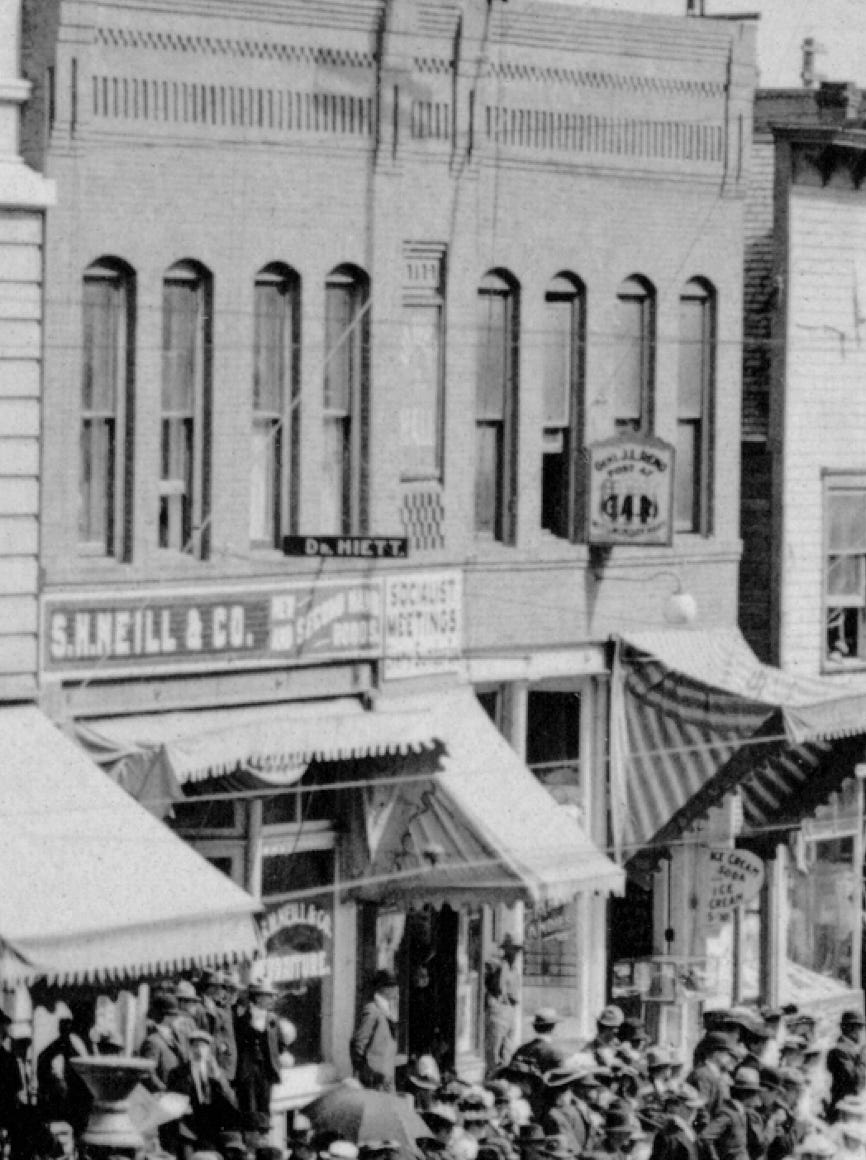Yesterday’s News Remembering Our Forgotten Past April 2024
The Oliver Block
Oliver Hall/Oliver Block
Daniel K. and John W. Oliver built the Oliver Block, a two story brick building, in 1892 on property they had owned for a number of years. It became she source of regular income for the family for the next fifty years.
Other Oliver buildings had been constructed before the Oliver block A story in the Spokane Chronicle in 1890 stated that “THE OLIVER BUILDING stands opposite the Nichols block. It is a one-story brick, 30x70, costing $7,000. Until 1891 the address of the building was 207-209 E. Riverside, but after the renumbering of streets in 1891 the new building’s address was 334-336 W. Riverside.
When the new building was completed it occupied an area of about sixty by ninety feet, was two stories and built of brick. It is pictured to the right in the period of the late 1890s. A sign on the second floor to the right side of the building proclaims: “G.A.R.”
Numerous businesses over the next twenty years occupied the main floor, from restaurants to barber shops and candy stores. The Rosenkrans photograph studio occupied a space there in the 1890s. The California Restaurant was located there for a time. An upholstery repair shop conducted business at the rear of the building for a time .
The second floor was mainly occupied by Oliver hall, a space used by various organizations for meetings and services. Oliver hall was apparently available for rent to anyone if the space was available. Typical of the organizations that used it in 1893 were the Brotherhood of Railroad Trainmen, a variety of socialist organizations. a variety of spiritualists, the social organization The Royal Arcanum of which Daniel was a member, various fraternal organizations and lodges, the G.A.R. (Grand Army of the Republic), the Universalist society (a precursor of the Unitarian Universalist Church), and a multitude of Christian organizations and preachers.
It was used for religious services, lodge meetings and all sorts of other type of Social gatherings. Organizations that used it included the Brotherhood of Railroad Trainmen (1893), The Royal Arcanum (social group to which Daniel belonged), Reno Post of The Grand Army of the Republic (Civil War Veterans of which Daniel was one). The hall was frequently referred to as the G.A.R. Hall. Also meeting in the hall were the Lincoln Lodge, the Universalist society (predecessor to Unitarian Church)(weekly from 1892-1906), the First Spiritualist Society (1893), the North Side Baptist Sunday school (1898), a social organization named Sorosis, the Vincent Congregation (Christian), Grace Baptist Church Sunday school, Olympus Lodge Theosophical society, Woodmen of the World (1893) Independent Order of Good Templars (1893), Wile Rose Juvenile Temple, State Medical Society (1894), Spiritualist Society (1894), The Rev. J. Lewis (1895), the Canadian American Society (1895), Freeman’s American Silver Federation (1895), People’s Party Central Club (1895), Independent Order of Foresters (1895), Kindergarten Association (1895), Spokane Ethical Society (1895), Spokane Secular Society (1896), Eclectic Society (1896), and the Divine Healers (1896). On March 29, 1900 a headline in the Spokane Chronicle declared: COLORED MEN FORM A LODGE, Grand United Order of Odd Fellows Organized in Spokane. “The first fraternal and benevolent order of colored men to be established in the city was organized at Oliver hall last Monday evening, when Spokane Lodge No. 4794, Grand United Order of Odd Fellows, closed its charter and announced itself ready for business. The organization of the new lodge was the result of a movement which had been on foot for the past year to establish such an order, Rev. S. J. Collins having been very active in the matter. The new lodge starts off with a membership of 19, including some of the most prominent colored citizens of the city.” The story then offered a list of officers and ended with “The regular meeting will be held twice a month in Oliver hall.”
The Oliver block passed into other hands after the death of Amanda Oliver in 1941 and stood on that spot until January of 2000 when it burned to the ground. The last business to occupy the building had been the El Toreador, a Mexican restaurant.
